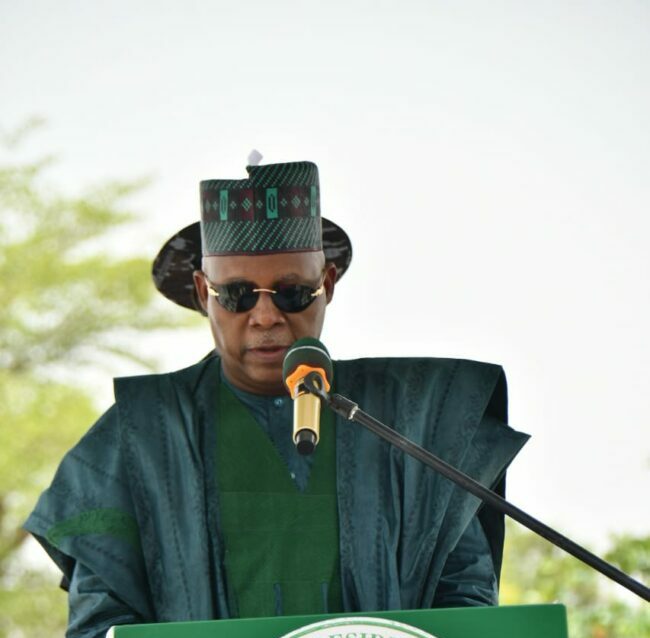The Vice President of Nigeria, Senator Kashim Shettima, launched the Accelerated Senior Secondary Education Programme (ASSEP), an initiative of the North-East Development Commission (NEDC).
Speaking at the Banquet Hall of the Government House Bauchi, the venue of the ceremony, the Vice President commended the performance of the North-East Governors in ensuring effective service delivery in the education sector.
He lamented the negative impact of the insurgency on the education sector in the subregion, saying that it has really set the subregion backwards.
The VP said that a lot must be done to regain the lost glory of education in the subregion, which has the potential to be a leader, urging the governors to continue to synergize with a view to improving the standard of education in the region.
While commending the NEDC for the initiative of ASSEP, he promised that the Federal Government will continue to support good initiatives that will boost educational development in the entire country.
Also speaking, Bauchi State Governor, Sen Bala Mohammed Abdulkadir, said that his administration is doing everything humanly possible to uplift the standard and quality of education in the state.
Bala Mohammed said that his administration has put in place various plans on how to reduce the menace of out-of-school children in the state by introducing measures and steps.
The governor assured that his administration will continue to partner with relevant stakeholders, including NEDC, to provide access to basic education for children in the state.
In remarks, Senior Special Assistant to the President on Regional Development Programmes, NEDC, Dr. Maryam Masha, assured that the Federal Government is always ready to initiate and implement developmental programmes.
She said that the ASSEP was conceived to ensure that students completed secondary school in the North East subregion in order to bridge the wide gap in that sector of education.
International Development Partners, including UNICEF, commended the initiative of ASSEP by the NEDC, expressing confidence that it will complement what they are doing in terms of collaboration and support.
An overview and concept of ASSEP (Accelerated Senior Secondary Education Programme) indicated that it is a federal government intervention to transform education outcomes in the North East subregion.
The focus will be on subjects with a direct bearing on science, technology, mathematics, and agricultural (STEMA) courses, targeted at students in senior secondary schools across the six states of the north-east (Adamawa, Bauchi, Borno, Gombe, Taraba, and Yobe).
It is part of concerted efforts by the Federal Government through the North East Development Commission (NEDC) to address specific gaps in the quality and reach of secondary education in the region.
Target gaps include the quality of instruction, the quality of teachers, and the adequacy of facilities.
On the participant side, it is designed to promote awareness and interest in education opportunities beyond the level of secondary education.
For programme outcomes, ASSEP is designed and will be implemented to drive transformational change in vital education outcomes, including admissions to higher institutions.
It also includes achieving quantum growth in the headcount and quality of intakes into higher institutions within and outside the country.
On skill development, it facilitates the development of mental aptitude and the acquisition of vocational skills among secondary school leavers as undergraduates or in other productive roles in society.
For teacher quality upgrades, it will raise the quality of teaching staff in public schools across the northeast as a foundation for sustained education outcomes in the North East.
The Programme components include Accelerated coaching, or ASSEP, is designed to provide students in senior secondary schools with intensive coaching sessions that fast-track learning application and mastery of important concepts, techniques, and principles across major subjects.
Coaching sessions will cover assigned curriculum content but will emphasise students’ comprehension and ability to apply relevant content in examination settings.
To address the shortage of modern facilities for effective instruction, ASSEP will deploy virtual reality (VR) technology to achieve scale in quality instruction with virtual instruction and a distributed learning experience.
The use of VR will be used to eliminate obstacles related to physical distance and limitations on the number of in-person instructors.
For teacher quality improvement, ASSEP will work with capable partners such as the National Teachers Institute (NTI) to raise the quality of teaching staff at scale.
The teacher training programme will extend beyond curriculum content to incorporate models for effective learning that help to immerse students in learning experiences beyond traditional teacher-led approaches.
Competitive quiz competitions and periodic quiz competitions will be deployed to stimulate interest in educational content and build in students the spirit of excellence and enterprise in academic pursuits.
The quiz process will begin at the school level and progress to local government, senatorial-district, state level, and regional finals, with prizes and rewards for excellent results.
Through its dedicated centres, ASSEP will hold sessions to help students develop 21st-century and vocational skills. It will integrate the use of modern technologies to help students build valuable skills and knowledge for solving practical problems.
ASSEP will also partner with private entities and business schools to provide scholarships and internship opportunities to students who show interest in enterprise and innovation for the acquisition of digital and future-ready life skills.
ALSO READ THESE TOP STORIES FROM NIGERIAN TRIBUNE
